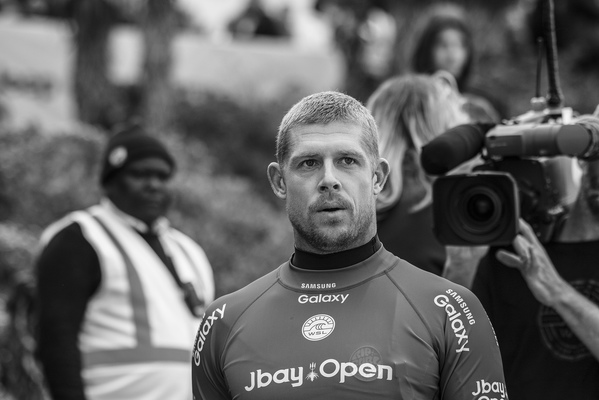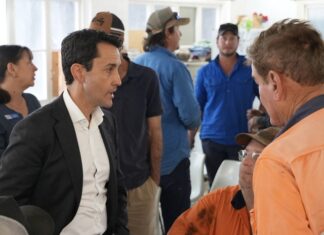By PHIL JARRATT
THE great whites stayed away from J-Bay last weekend, although Mick Fanning must have had a momentary heart flutter when the lead fin of a pod of dolphins appeared just as his semi-final with Julian Wilson was getting underway.
But it was a good omen, and even though the draw prevented us from seeing a Fanning/Wilson final played out properly a year after the sharkus interruptus, it was an excellent semi and a great ramp for Mick, who was unstoppable, even against John Florence. I watched the final on the big screen at the Quiksilver Boardriders bar at Echo Beach in Bali, where every Fanning power gouge and hack got a standing ovation and a spray of Bintang. Mick might be a bit old school but he is still the surfer’s surfer.
And now, despite having declared 2016 a “rest year”, he is number five on the world rankings and an outside shot at another world title. With the shark off his back and the fire back in his belly, will he show up in Tahiti next month with guns blazing?
I wouldn’t be surprised.
Remembering the summer of ’73
FOR my sins I’ve been working on a memoir, hoping to recall the saltier moments of a misspent youth before it’s too late. But perhaps it is too late already!
I’m pretty good on childhood, and have been able to cross-check with two sisters whose brain cells are pretty much intact, but when it comes to early adulthood, about the time the drugs began to kick in, I’m all over the shop.
What did they say about the ’60s? If you can remember them, you weren’t really there. Well, it’s a bit like that.
Take, for example, the European summer of 1973, when a mate and I hitch-hiked and surfed from Cornwall to Portugal and back again with virtually no money. It was a momentous time in the world, with a new war in the Middle East, oil and power shortages and three-day working weeks across the UK, and the constant threat of terror not from Islam but from Ireland.
For us, fresh from a newspaper office in Newcastle, NSW, it was a rollicking boy’s own adventure, free-camping on rat-infested foreshores, living on sardines and cheap wine in plastic bottles, surfing alone at a fast-breaking wave in front of the sardine processing plant that decades later became known as Supertubos.
The diary I kept of these travels was lost long ago, but I ripped through my account confidently, with just one article I had written for the National Times to guide me. It was called, “No money, no wife, no friends – only sardines: a taste of life in Portugal”. The quote referred to our sardine-rich fisherman friend Francisco who had returned from the battlefields of Angola with what is now known as post traumatic stress disorder, but it could have just as easily referred to us.
An outcast among his own, Francesco would trade sardines for a broken English conversation, about the weather, about the rats, about a woman he saw at the market and fancied.
But man cannot live on sardines alone. Madame Sirly who owned the bar on the pier would not take conversation for wine, for example, and our pile of escudos was dwindling rapidly.
For decades I have been telling the story of how we went to Lisbon and sold our blood to the Red Cross for $US20. For me, it illustrated not only the extent of our poverty but also the moral ambiguity of the time.
When I came to write about it in detail, however, I found I could not recall certain aspects of the process. Like, was it a spotless clinic or a dingy back room up some dodgy alley? Did we get paid on the spot? I couldn’t remember, and this episode certainly wasn’t in my National Times article, so with an hour or so to kill in Brisbane Airport the other night, I phoned my travelling companion, still a best mate although one I see too little.
“We didn’t sell our blood,” he said matter-of-factly. “They wouldn’t take it. We traipsed around Lisbon all morning and were rejected at three hospitals and clinics, so we spent our last escudos on a steak and a bottle of red.”
I was shocked. I said: “So tell me what else didn’t happen. Did we run with the bulls in Ampeuro? Did we surf Supertubos alone day after day?”
He’s a good mate and he’s agreed to read the whole section relating to our travels. I cut and pasted it and emailed it to him immediately, before he changed his mind, but I haven’t heard back yet, and frankly I’m dreading his email. If I can get one story so fundamentally wrong, and tell it over and over again for more than 40 years, how many other stories have I got wrong?
The publisher is screaming for the manuscript, the pressure is on. I think I’ll just duck out for a quick head-clearing surf and get back to my Google fact-checking.










